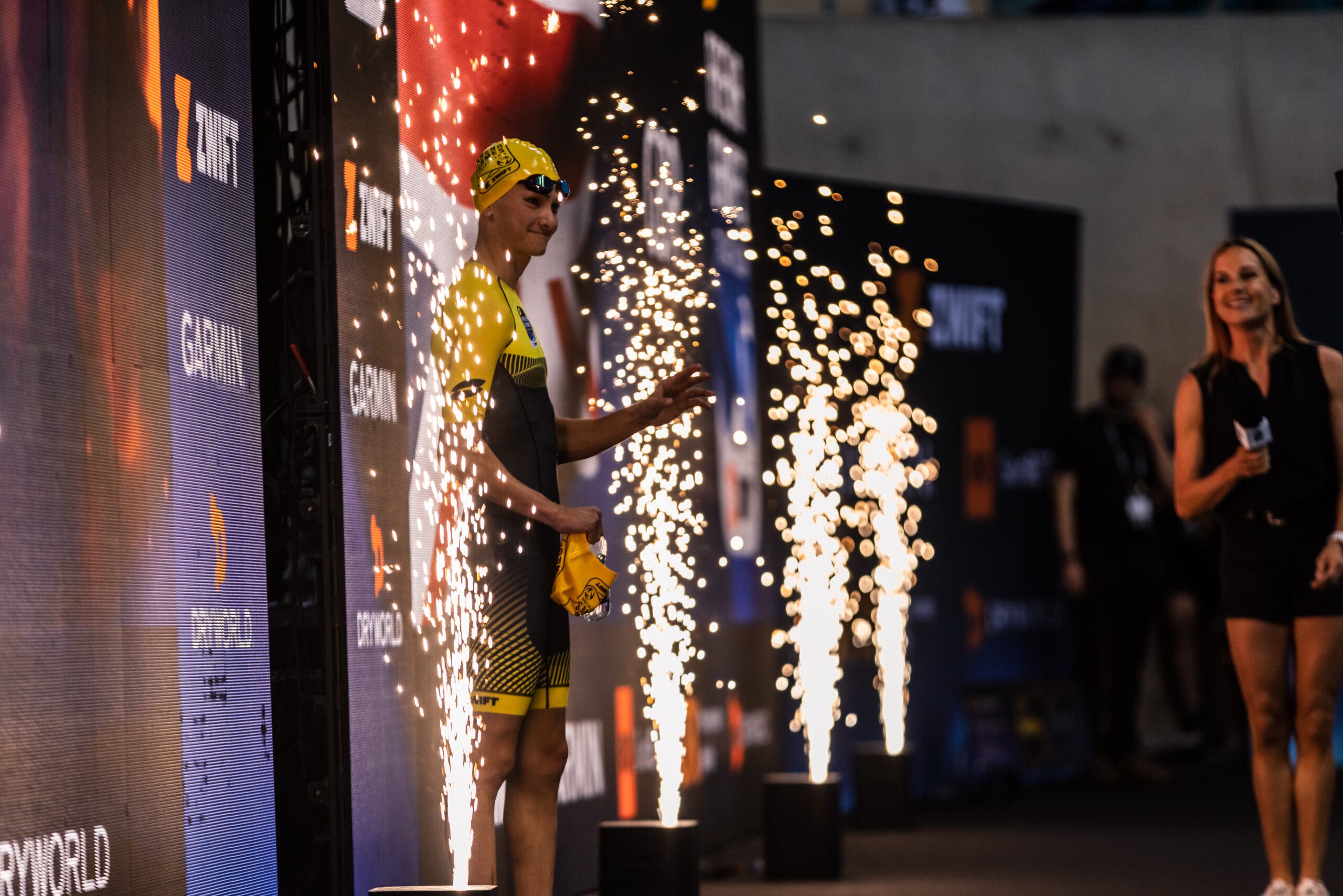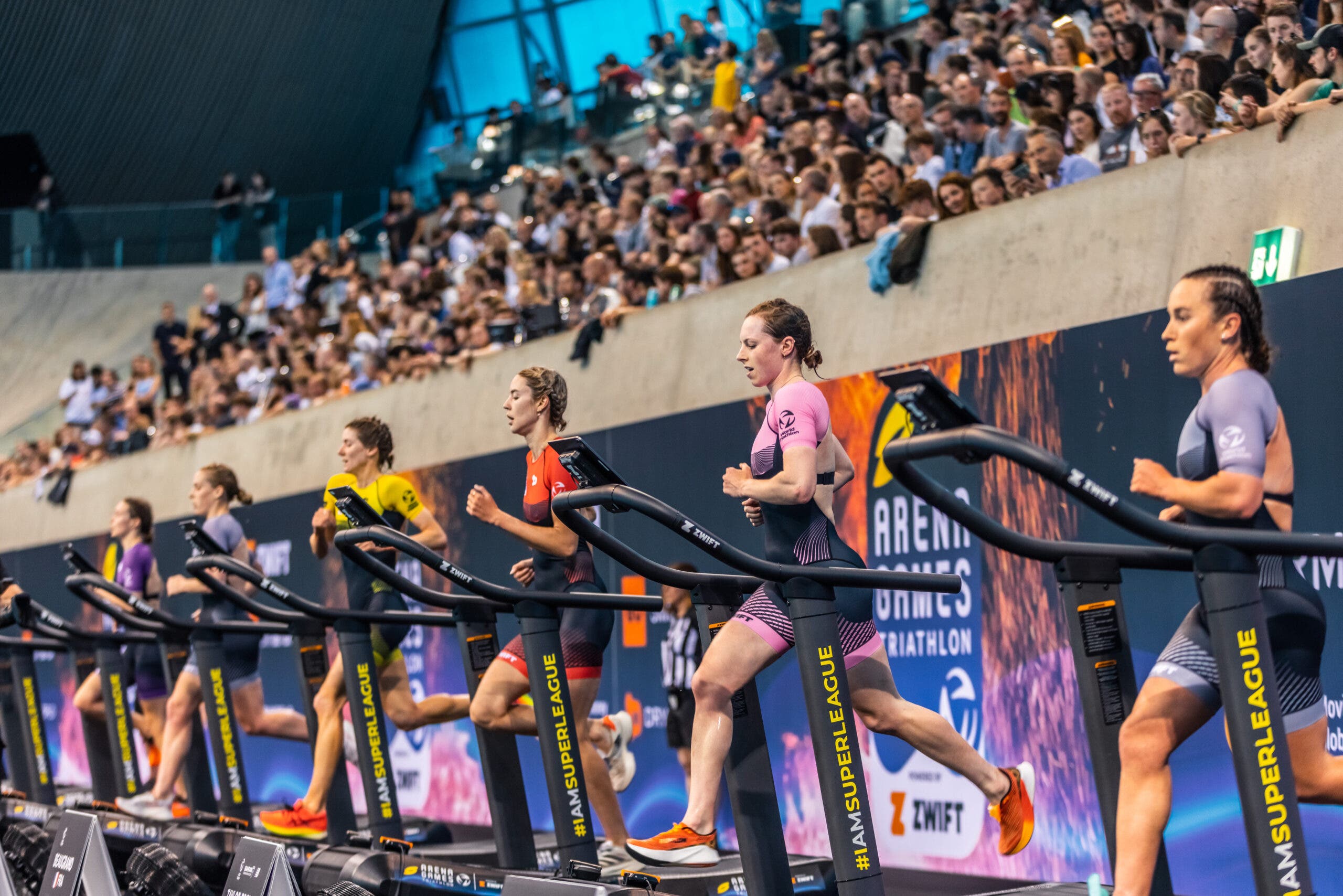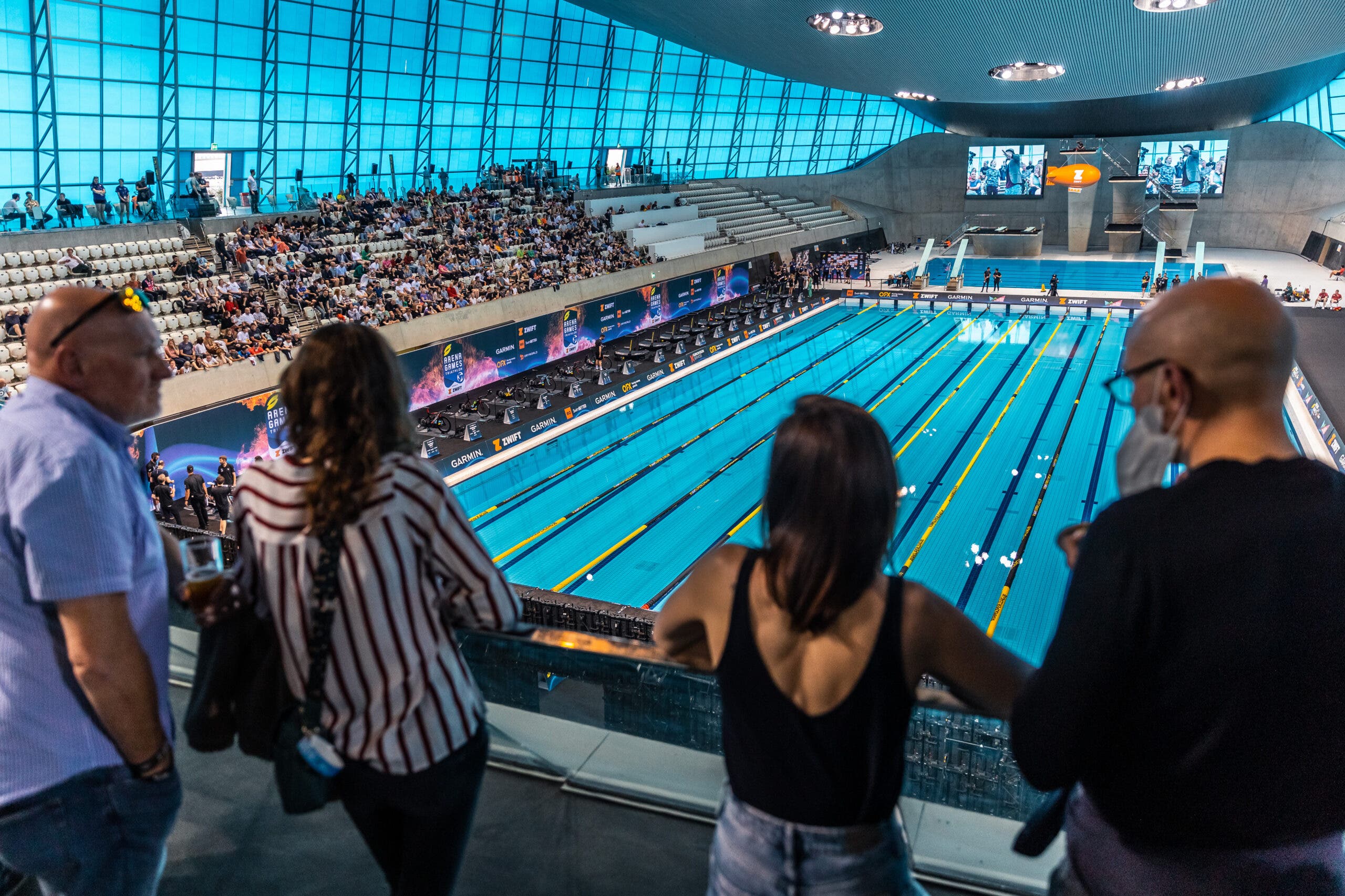Are The Super League Arena Games The Most Exciting Show In Tri?

Super League Arena Games in London (Photo: Courtesy of Super League)
“It’s a good distraction because you can’t hear yourself breathe. In Rotterdam, all I could hear was myself dying.”
That’s the inimitable Olympic medalist Jess Learmonth’s take on the benefits of a crowd returning for the Super League Arena Games in London, complete with a candid reflection of just how hard triathletes push themselves in this style of racing.
The sheer “brutality,” as the women’s winner Cassandre Beaugrand puts it—an exercise in gulping as much oxygen as possible from the stifling air—is also one of the reasons why this gladiatorial format might eventually succeed.
Another is the raucous energy that greets the athletes as they are announced on to the pool deck for the finals in the cacophonous Aquatics Centre. The crowd is especially vociferous for the home talent—Learmonth, Georgia Taylor-Brown, and Beth Potter in particular, plus London’s own Alex Yee in the men’s race. And while France’s Beaugrand puts on a masterclass to top Potter and Learmonth, in that order, and Germany’s Justus Nieschlag is arguably as impressive when spoiling Yee’s homecoming, it doesn’t dampen the mood.
“Hello everybody, and welcome to the future!” greets Markus Floth, in what looks like a porkpie hat, natty jacket, and scraggy denim shorts. Floth, a host at MTV Austria, is compère for this second leg of Super League Triathlon’s 2022 Arena Games roadshow—with Singapore’s grand final wrapping up the miniseries in a fortnight.
His sidekick in rabble-rousing is none other than Olympic 2016 bronze medalist, Vicky Holland. (Holland, who is still competing, may just have found her post-race calling in race calling.) The two of them have the assignment to gee up the crowd for two 35-minute races in a two-hour broadcast package. It’s pushing 90 degrees F, as 1,700 people pour in to dial the temperature up still further.

The fans have paid the equivalent of $15-25 for tickets, and with only a handful not sold, the atmosphere for the afternoon finale builds nicely. Super League aren’t bad at this sort of thing. From inception, a first race in Australia’s luxury enclave Hamilton Island way back in 2017, presentation has been its forte.
The yellow and black branding is now synonymous with the brand—the technical officials looking like they’ve been hauled straight from the NFL—and while the number of corporate partners is increasingly growing, headliner Zwift (let’s face it, they couldn’t do this without them) stamps its authority with an imposing orange blimp dangling from the high board in the diving pool.
Enthusiasm aside, however, the other thing Team Holland-Floth must achieve is to explain what the hell is actually going on. That might be the tougher gig.
The components are a 200m swim, 4km cycle, and 1km run. That’s the easy bit. But given the concept is swim-bike-run, then run-bike-swim, then swim-bike-run, with a time-trial final stage based on time deficits, it’s not uncomplicated for the uninitiated. Thankfully, the duo are ably supported by the big screens—something the Arena Games is again getting very right. Unlike the outdoor version of Super League, the Arena Games are conducted entirely inside these massive arenas—with the athletes swimming in an Olympic-size pool before jumping on those Zwift-connected treadmills and bike trainers.
Hence, the big screens. The display runs the width of the pool and has a lot of information to cram in. But like a triathlete packing a transition bag, they’ve somehow managed to get the names, nationalities, race positions, time gaps, time splits, watts per kg, and distances clearly presented alongside the live Zwift footage without it being overwhelming.
It might be underscoring the obvious, but regardless of whose legs are moving fastest, triathletes on trainers and self-powered treadmills form a non-moving straight line. If the graphics aren’t on point, even the most educated observer won’t have the foggiest as to what’s going on.
Watch all 2022 Super League events on Outside Watch.

Other than assigning France’s Beaugrand a Union flag rather than the tri-colore for stage one, there weren’t noticeable hiccups. Where it becomes more technically challenging though—and the stuff of nightmares for chief executive and co-founder Michael D’hulst—is when technology fails.
In Munich it was Gordon Benson who fell to technology failures. Here, the unlucky one is Aurelien Raphael. The Frenchman’s avatar went down in the heats, meaning he didn’t qualify for the final through little fault of his own. Where Raphael won in Munich, this time he had his feet up with a beer in the stands while his coach had some choice words for the officials. On the roads, you can almost accept your fate with a flat tire or crash, but when the wifi drops out it’s a lot less palatable.
That man in charge, D’hulst has the head scratching task of making sure it doesn’t continue to happen. “The reality is we are learning as we go,” he explains. “It’s so different to real life racing, where there is 20-30 years of experience, and you know what can go wrong. We did the first event 18 months ago and we’re doing professional broadcasts to the world stage. This is our test. We’re under the microscope. But the good thing is there’s not been one technical problem we can’t overcome by looking at the engineering and tech. The athletes understand they are part of this journey and it’s not yet perfect. They’ve embraced it though, and that’s an important point to make as this format matures, and we make it stick.”
The Arena Games were borne out of the pandemic as a “COVID-secure” solution, and no one is quite sure where they’ll end up. Now in partnership with World Triathlon, the Singapore final—which offers double points—will crown a first and official triathlon esports world champion. As an outdoor event and open water swim in Singapore, the format will evolve again slightly with 40 men and women triathletes (double that of Munich and London), and the introduction of a repechage. Triathletes carry their best score from either Munich or London, so Potter and Raphael, Beaugrand and Nieschlag, lead the way. Beyond that Super League hopes it eventually becomes an Olympic e-sport. Bold ambition, but the IOC are making noises.
“We’ll continue to grow the show element of it,” D’hulst said. “We put an athlete in a pink uniform, and it’s a pink athlete in real life, pink athlete in the virtual world, and pink numbers on the screen, so the crowd understands the relationship. The aspiration is to make triathlon more of a spectator sport. We can’t assume everybody knows every name.
“The racing was great, but we still need to develop it as a spectator sport for in-venue. I’ve been running up and down the stairs seeing how we can better connect the crowds to the race floor. Somehow we need to break up the dynamics of the racing. I’m not entirely sure how to do it yet, but there has to be a way.”
An experiment for London was to switch off the drafting effect on Zwift for the bike leg. Just as they adapted the short chute for the outdoor series, it’s a late change, and a very Super League thing to do. Even being in cahoots with World Triathlon isn’t going to stop the tinkering.
“Non-drafting is the most honest racing,” D’hulst said. “Having drafting involved arguably makes it a runners and swimmer race (cue déjà vu to ’90s drafting v. non-drafting debates). But we’re learning as we go. It’s always about the racing.” They’ve left the question open-ended for Singapore. For now.

One sure-fire win is when the crowd knows the performers. “I got stopped about six times to get a selfie on the walk over,” Potter adds. “Although it might have been the very bright Asics kit I had on.” Potter has become one of the stars of this format. The 30-year-old Scot won here last year, and a fortnight ago in Munich where, had it not been in the virtual world, she might have lapped out the entire field. Along with Learmonth she was on cruise control in winning the morning heat as Beaugrand kept her powder dry.
But it’s a cruel expose for those off the pace. Isolated in your lane in the swim, less rest between stages, and whatever deficit there is heading into the final swim-bike-run sequence you have an agonizing wait on pool deck. To illustrate, as the final athlete, Zsanett Bragmayer, dived in, Beaugrand was all but clambering out of the pool in the women’s final stage.
If the Hungarian felt spat out the back, at least it wasn’t in the same manner as Czech Petra Kurikova in Munich, who was DQ’d in the heats for spitting on the pool deck. This time Kurikova snuck through to the final, and proudly left with a clunky nameboard tucked under her arm as a memento.
The most punishing form of triathlon? It’s certainly up there for the highest octane value. “It’s fun when you feel good. When you don’t, it’s not so much fun—more like a really hard training session that you have to finish,” Potter said. D’hulst thinks the recipe is getting better all the time for those tuning in and turning up: “We’re seeing more people watch it. We are creating something where there’s a big show happening—an arena of sport.”